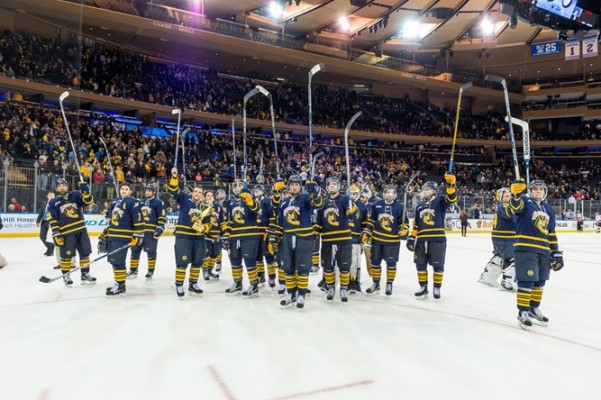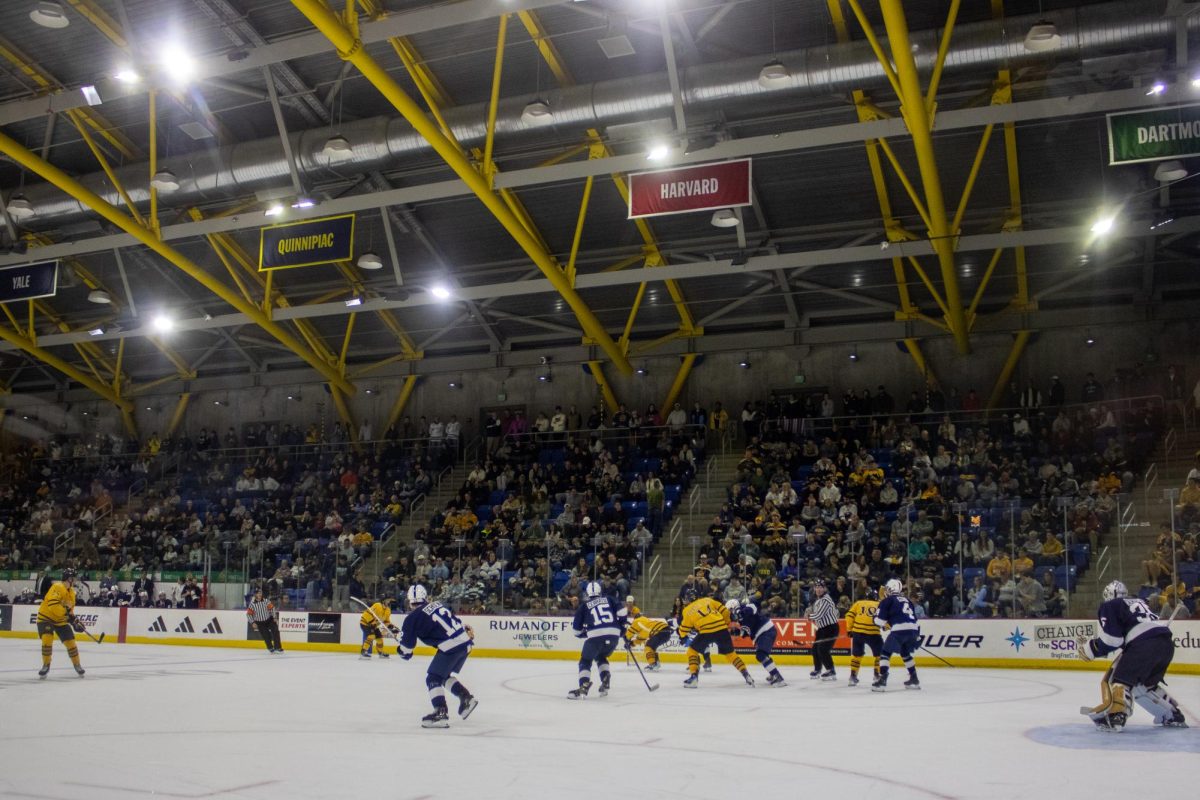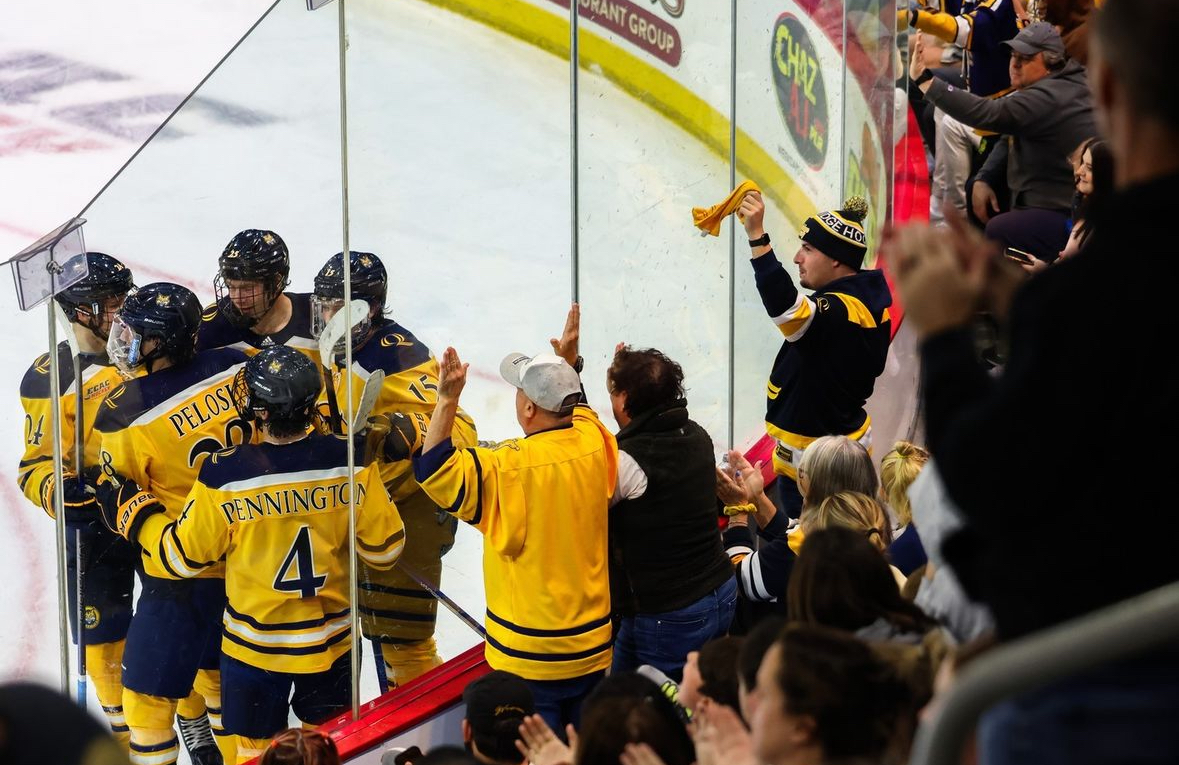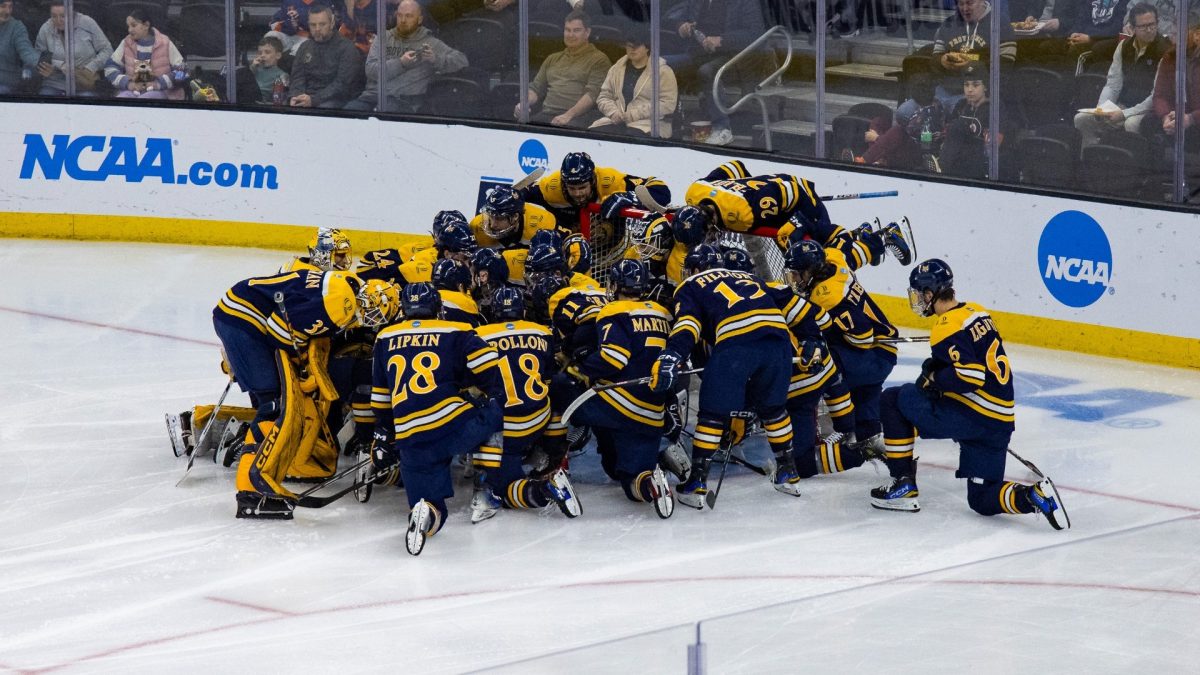Photo Courtesy: Quinnipiac Athletics
By: Victoria Rutigliano
If you’re a hockey fan, you probably know Madison Square Garden in New York City as one of the most famous hockey arenas in the world.
Then again, it is nicknamed the World’s Most Famous Arena.
If you’re a hockey player, you probably have only dreamed of being able to look up at the sea of thousands of fans and play for your team.
For Quinnipiac’s Derek Smith, not only did he get to play at MSG, but he was able to seal the victory for his team in overtime in front of a crowd of 12,016 screaming fans.
With Smith’s goal three minutes into overtime, the Quinnipiac Bobcats (19-1-3, 10-0-2 ECAC) defeated the Harvard Crimson (8-3-3, 4-2-3 ECAC) 5-4 and finished off what the team started in the first period.
“That’s something you dream of in this big of a rink and that situation,” Smith said. “It was awesome. It was fun.”
Head Coach Rand Pecknold said this was to be expected from a player who’s been great all year.
“He’s been awesome all season, he’s been excellent. Big reason we are where we’re at,” Pecknold said. “He just gets better and better each season. He started as an eighth defenseman his freshman year and now he’s our two or three.”
In 36 seconds the Bobcats took the game from a scoreless tie to a 3-0 advantage.
Alex Miner-Barron netted the first goal for the Bobcats and his second of the season roofing one over the right shoulder of Harvard goalie Michael Lackey. Twenty-two seconds later K.J. Tiefenwerth scored on a rebound from Tommy Schutt.
But the Bobcats didn’t stop there.
Immediately following the face-off at center ice, Sam Anas added to the Bobcats goal total increasing their lead to 3-0.
A few minutes later Travis St. Denis notched his own tally off a rebounded shot by Sam Anas.
The “Rivalry on Ice” didn’t look so much like a rivalry when the buzzer went off at the end of the first with Quinnipiac dominating at 4-0.
But the second period told a completely different story than the first.
Harvard’s Colin Blackwell said coming into the second period the team knew the final score could go one of two ways.
“Either we can pack it in and call it a night, or four goals chip away one at a time and I think guys kind of bought in,” he said. “There was still forty minutes left to play so we just had to kind of believe in one another and keep chipping away.”
Harvard proved its resilience in the second period scoring three goals over the course of the 20 minutes.
Alexander Kerfoot started it off seven minutes into the second period netting his third goal of the season off a pass from Jimmy Vesey.
Tyler Moy cut the lead in half a few minutes later scoring his fourth goal of the season after deking not one, not two, but three Quinnipiac players, including goaltender Michael Garteig, on a power play opportunity.
The Crimson’s Ryan Donato scored his fifth of the season and brought the game within a goal with just over two minutes remaining in the second period.
The game was starting to look like more of what a rivalry on the ice should be.
Blackwell scored midway through the third period to send the game to overtime. The shock by Quinnipiac fans in the rink was almost audible.
While the Crimson were able to chip away at the Bobcats first period success and a glaring 4-0 deficit, they were not able to turn the game completely around.
The battle went to overtime where the Bobcats scored their fifth goal of the game, defeating the Crimson.
Quinnipiac took the game 5-4 and hoisted the “Rivalry on Ice” trophy in front of the of fans who made the trip out the the World’s Most Famous Arena.
“It was a pretty special moment tonight,” Pecknold said. “The whole Madison Square Garden experience was phenomenal, our fans, it was pretty cool.”
Notes:
· It’s no surprise both teams notched so many goals. Going into the game Harvard led the ECAC in goals-per-game with 3.92, with Quinnipiac just behind them with 3.70.
· What is surprising is the shot total wasn’t anything significant with the final shots tallying 33-21 in Quinnipiac’s favor. Four goals on 21 shots isn’t usual for the Bobcats, or goalie Michael Garteig as the team had the lowest goals-against-average coming into the game with 1.40.
· Whether it was from the taking in a little too much of the scenery or still trying to patch up the wounds after dropping to Boston University two nights before, the Crimson did not come out to a strong start whatsoever. Prior to this game, Harvard had only allowed five goals total in the first period (17.9%) out of the 28 they had allowed in all season.
· Both teams started off slow in every period, as no goals were scored earlier than seven minutes into the period. Quinnipiac’s success in the first seemed to come from a lack of back-checking from the Harvard offense. In the second, the Crimson were able to push back against a complacent Bobcats squad and even the score out.






